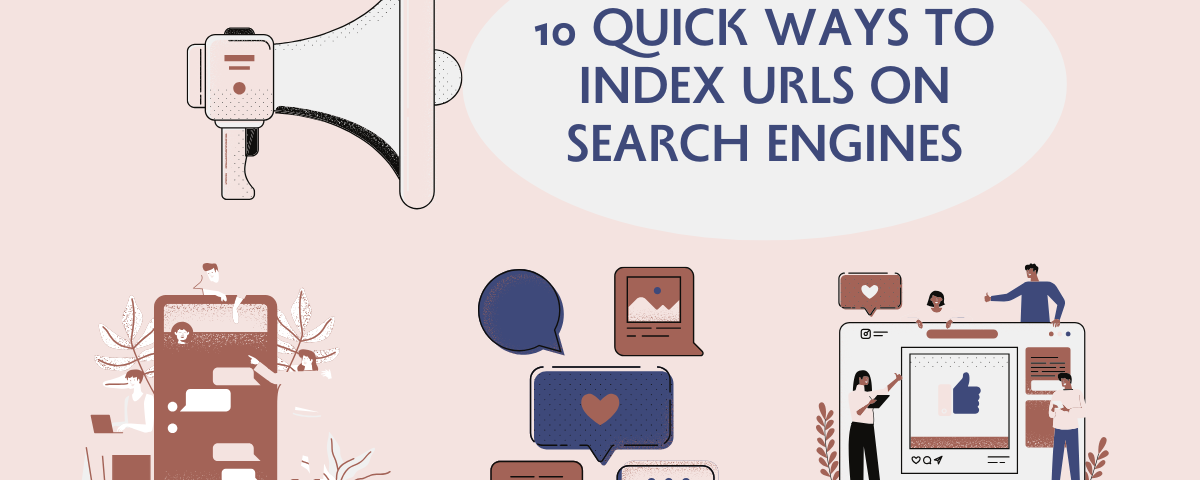
Top 20 Free SEO Tools for Beginners in 2025
February 14, 2025
What is Semantic SEO and How to Implement It?
February 28, 202510 Quick Ways to Index URLs Faster on Search Engines in 2025

Are your website’s URLs taking too long to show up on search engine results? In 2025, URL indexing remains crucial for ensuring your content gets the visibility it deserves. Without proper indexing, your hard work might never reach your audience. Let’s explore 10 quick and effective ways to index your URLs faster.
What is URL Indexing?
URL indexing is the process by which search engines like Google and Bing add your web pages to their databases. Once indexed, your page becomes eligible to appear in search results for relevant queries.
Search engines use bots, also called crawlers, to navigate through your website, evaluate its content, and decide if it deserves a spot in its index.
Why is Fast Indexing Important?
Fast indexing ensures your website gets noticed quickly, especially if you’re publishing time-sensitive content. A page that isn’t indexed won’t drive traffic or improve rankings, leaving you in the digital shadows.
1. Submit URLs Directly to Search Engines
The easiest way to get your URLs indexed is by submitting them manually.
- Google Search Console: Use the “URL Inspection Tool” to request indexing.
- Bing Webmaster Tools: Submit URLs under the “Submit URL” section.
2. Create and Submit an XML Sitemap
XML sitemaps act as a roadmap for search engines. Ensure yours is updated with all new URLs and submit it via search engine webmaster tools.
Tools like Yoast SEO or Screaming Frog can help generate sitemaps quickly.
3. Update Robots.txt File
Your robots.txt file tells search engines which parts of your site they can crawl. Ensure you’re not accidentally blocking crucial pages. A well-optimized robots.txt file looks like this:
4. Optimize Website Speed
Search engine bots prioritize faster websites. Slow-loading pages might get skipped during crawls. Use tools like Google PageSpeed Insights or GTmetrix to diagnose and fix speed issues.
5. Use Internal Linking Strategically
Internal linking helps crawlers find new content faster. When you publish a new blog, link it to older, high-ranking pages. This practice also enhances user experience.
6. Share URLs on Social Media
Social platforms like Twitter, LinkedIn, and Facebook can accelerate indexing. When you share a URL, search engine crawlers notice the activity and prioritize it for indexing.
7. Build High-Quality Backlinks
Backlinks act as trust signals for search engines. The more reputable sites link to your URL, the faster it gets indexed. Focus on earning links from industry leaders and trusted domains.
8. Regularly Update Website Content
Freshness matters. Updating your content with new insights signals search engines to re-crawl and re-index your pages. Use a content calendar to stay consistent.
9. Monitor and Fix Crawl Errors
Tools like Google Search Console highlight crawl errors that prevent indexing. Common issues include broken links, server errors, and 404 pages. Fix these promptly to keep your site crawl-friendly.
10. Leverage Ping Services
Ping services notify search engines when your content is updated. Platforms like Ping-O-Matic are popular for instantly alerting crawlers about changes to your website.
Tips to Avoid Common Mistakes
- Over-indexing: Don’t submit irrelevant pages for indexing.
- Duplicate Content: Ensure your site doesn’t have duplicate pages, as they dilute SEO value.
Conclusion
Getting your URLs indexed faster isn’t rocket science, but it does require consistency. From submitting sitemaps to leveraging social media, these 10 strategies will ensure your content gets noticed quickly. Stay proactive, and watch your site gain traction in no time.
FAQs
-
How long does it take for a URL to index?
It can take anywhere from a few hours to a couple of days, depending on various factors like website authority and content quality. -
What tools can I use to check URL indexing?
Use tools like Google Search Console, Bing Webmaster Tools, or third-party platforms like SEMrush. -
Does indexing guarantee ranking?
No, indexing is just the first step. Ranking depends on numerous factors, including content quality and SEO efforts. -
Can a noindex tag be reversed?
Yes, remove the noindex tag, and resubmit the URL for indexing through search engine tools. -
Is it okay to resubmit URLs repeatedly?
Avoid doing this too often. Excessive submissions can flag your site as spammy.



